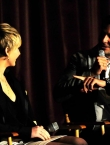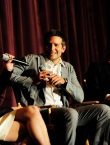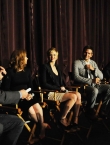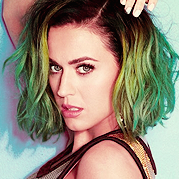ENTERTAINMENT WEEKLY: Jennifer Lawrence’s essay in Lenny got people talking very quickly. Did you anticipate the massive response to her letter before you published it?
LENA DUNHAM: Obviously, she’s a newsmaker, and she’s a force to be reckoned with, and whatever she does, whether it’s a film or press or flipping the bird, is massively impactful. But, I think what has been so thrilling is the way that people have taken this message and are really connecting to the inherent humanity in what she’s saying… I think people are responding to the content, they’re responding to who she is, but they’re also responding to the strength of the piece. I mean, there’s a lot of pull quotes from that piece. She masters the art of the pull quote on her first published essay.
Before she submitted the essay, did you talk to her about the tone she would be using? How much did you work with her on it?
This essay came fully birthed. I let Jen know that we were doing Lenny, and I basically just said, you know, if you ever have a feminist gripe that you want to share, we are a place where we want women to be able to do that safely. Very shortly thereafter, this piece arrived entirely, fully formed, and it was clearly something that she had been ready to write and that she was ready to express. And we’re very glad she did!
So she just emailed it to you just the way it is?
We do basic copy editing because everyone forgets a period or a comma every now and then, but she truly had the clearest sense of what she wanted to say. It just popped right out of her skull that way. And you know, obviously the message is amazing, but it’s just, she has a great tone as a writer. I think that honesty and that humor she’s just able to convey when she’s talking about an incredibly challenging, a pretty emotional topic, made it.
The issue has become a hot topic recently, and not just because of the letter. What are your thoughts on how the conversation has changed? Why has attention to it increased?
Well, I think what Jen did that’s so great in the letter is that she talked about learning that she was making less, but she also talked about the desire to be likable and how that interferes with our ability as women to advocate for ourselves, especially in situations that involve money. I loved that she took that approach to examine the industry but also to examine the societal factor, the fact that we raise our girls [in a way] that causes them to ask for less than they are worth…
What I really connected to when I read the piece was the idea of likability. It’s something I hear about all the time, whether it’s critique of my characters or critique of a director, and I think the fact that Jen was able to articulate that we spend so much time on our delivery that we forget about our message is so profound. “I’m sick of trying to find the adorable way to say something” is such a relatable statement. It’s so painful when I look back and think about all the moments that I minced words because of the fact that I didn’t want to be perceived as a bitch, a diva, or an a–hole.


















